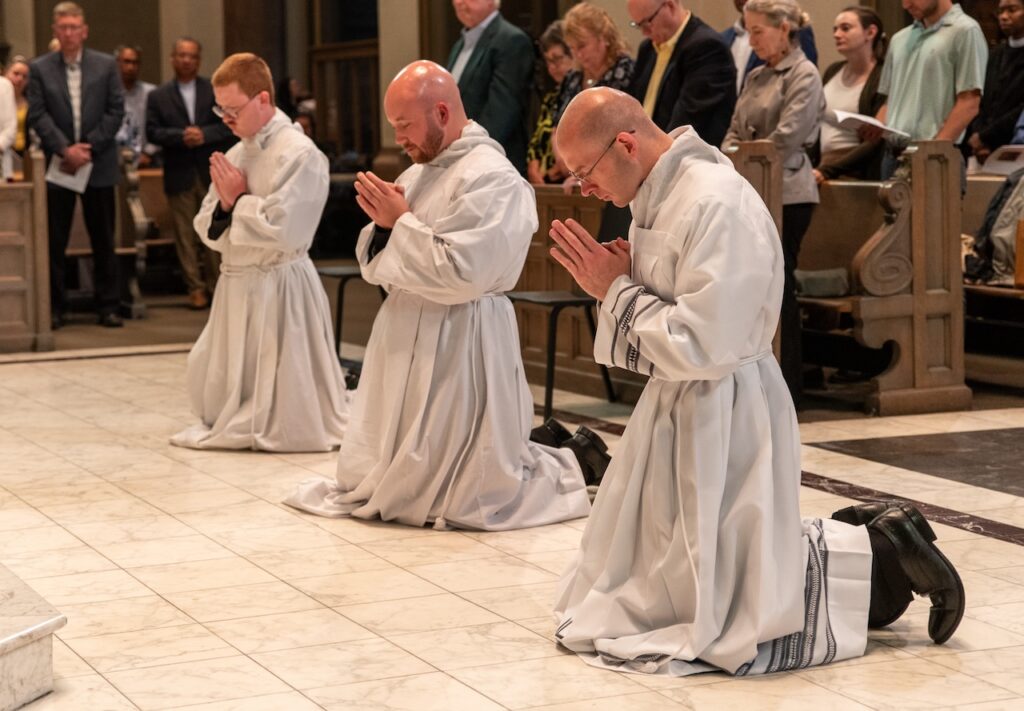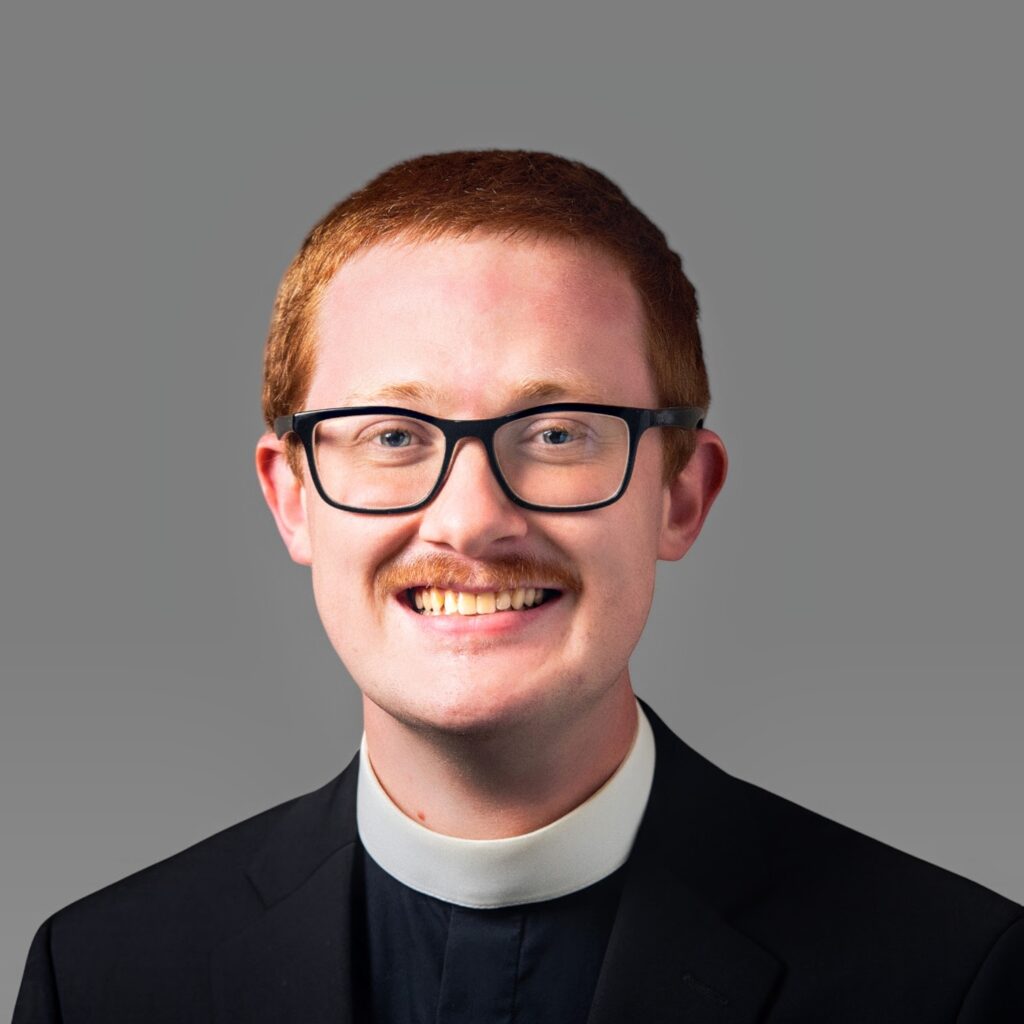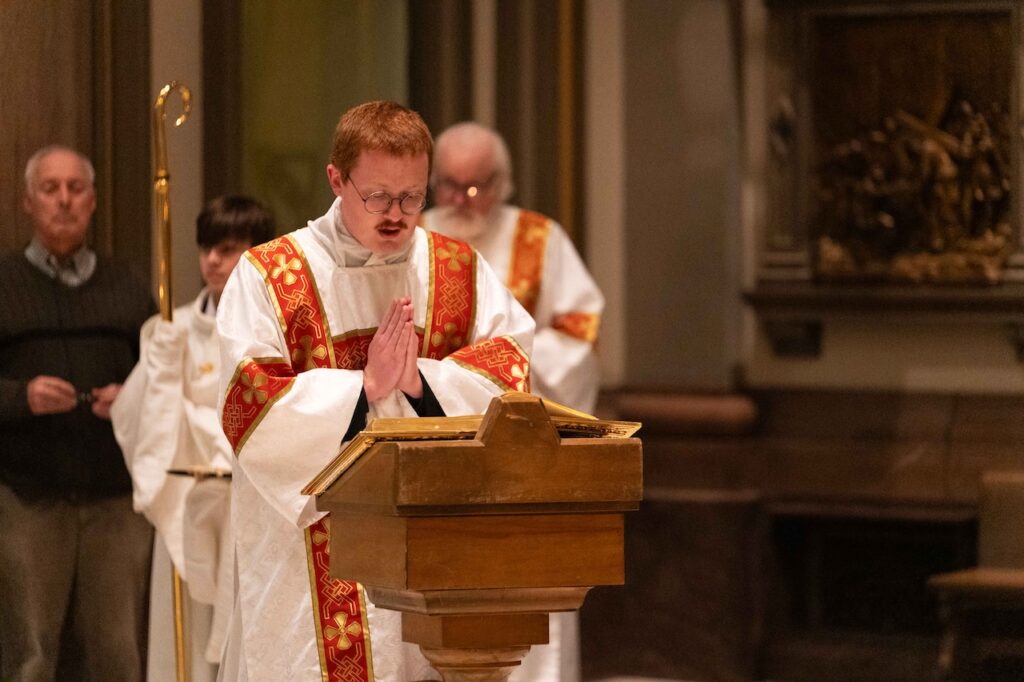Bishop Barry C. Knestout will ordain Deacon Andrew Clark, Deacon Samuel Hill, and Deacon Matthew Kelly to the priesthood at the Cathedral of the Sacred Heart, Richmond, on June 7 at 10:30 a.m. All are welcome to attend the Ordination Mass or to watch the livestream at richmonddiocese.org/livestream/. Please keep them in your prayers!

When Deacon Andrew Clark first entered St. John Paul II Seminary in 2016, he said that he was often approached by people just because he was wearing a collar. Since being ordained to the transitional diaconate on May 18, 2024, he added, he now has a certain degree of authority from the Church. But on June 7, that spiritual authority as a shepherd of the people of God will increase manifold.
“When I was a very green freshman seminarian, presented for the first time with responding to a crisis in somebody’s life, I had no clue what to do. No 18-year-old is going to be prepared for that,” said Deacon Clark. “Now, as a cleric, I have an office and a mandate from the Church. In other words, I can do something – not as much as a priest, but it’s definitely a radical shift, and above all else, a humbling experience.”

For now, Deacon Clark has not yet celebrated a baptism, wedding, or funeral – all of which can be celebrated by a deacon – let alone the consecration of the Eucharist, the sacrament of confession, or the anointing of the sick, sacraments that can only be celebrated by a priest. But he has grown to love offering blessings to people who ask, an experience that happens quite often.
“God has given me this great treasury of grace, and I want to dispense those graces freely and abundantly,” said Deacon Clark.
“Some of my friends ask me to bless things, and it’s a lot of fun. And often, I get stopped randomly by someone who wants a rosary blessed,” he said. “Then, I’ll have a conversation with them about where they’re coming from. I try to take the time to encounter that person and share a little bit of the joy of the Gospel with them in some way.”
He added that he is very excited to offer all the sacraments, especially when they bring relief to those who are suffering.
“I remember thinking when I was serving in a hospital: I can pray with someone, but I really wish I could offer this person the sacrament of confession, or offer anointing,” he said. “So there is a rich desire there.”
Deacon Clark’s vocation to the priesthood began when he was just seven years old, at a small chapel in Naples, Italy, where his father was stationed with the U.S. Navy. He had just received his first Communion a few weeks prior, and as the priest elevated the host during Mass, he felt a “great stirring in his heart” and – though he didn’t quite know how to verbalize it – a certainty that he was being called to the priesthood.
Now, “I am fulfilling my destiny, my vocation,” said Deacon Clark. “It’s been a long road getting from there to here. It’s very exciting getting to the end of this stage of my life journey, and in some respect, starting the more important chapter of my life.”
After graduating from Tallwood High School in Virginia Beach in 2016, he entered St. John Paul II Seminary in Washington, D.C. He graduated in four years, then moved on to his postgraduate studies at Theological College, the seminary of Catholic University of America (CUA).
Though the excitement of his approaching ordination was palpable when he spoke, he also said that there was “a strong sense of surrealism and nostalgia” in leaving an environment he’s known for nine years.
“CUA is a wonderful university with a unique learning environment, especially in the theology schools where I’ve studied. We have some of the best intellectual formation available in the United States,” said Deacon Clark. “It’s really diverse in terms of nationalities, religious orders, and you get to build friendships and learn a lot from everyone’s unique experiences.”
One particular influence has been Msgr. Robert Sokolowski, a well-known priest who teaches philosophy at CUA.
“Some of these professors are the definitive names in a given field,” said Deacon Clark. “Msgr. Sokolowski has courses being taught [on his work] at other universities. It’s intimidating, sometimes, but it’s a huge blessing.”
Before ordination, Deacon Clark had one more term paper to complete, a 35-page treatise on canonical penance in Roman Late Antiquity. At first, he said he was “slogging through” his final edits – then he took a moment to reflect and savor the moment.
“So many people would die to study theology and Church history, and we get to spend years doing it,” said Deacon Clark.
Outside of the prestigious university, the environment in Washington, D.C. prepared him for the priesthood in other ways, too.
“In D.C., you have to get your hands dirty,” said Deacon Clark. “You get battered around, and you learn a lot in those circumstances.”
Watch a video reflection by Deacon Andrew Clark.
Read about Deacon Samuel Hill.
Read about Deacon Matthew Kelly.
Lee los perfiles de los tres diáconos en español.

